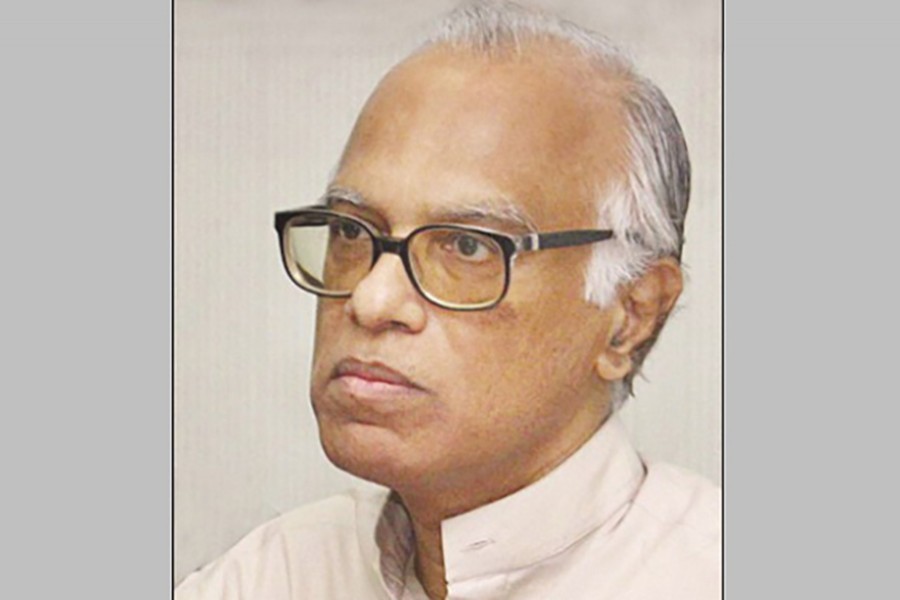Despite widening of the size of the middle class in the country from economic perspective, their participation in political leadership, intellectualism, and socio-cultural activities has come to the ground, said eminent economist Professor Wahiduddin Mahmud.
He added that the new type of middle class, which has emerged riding on a consumer culture derived worldwide from capitalism, are now less interested in nurturing the socio-political consciousness and participating in intellectual discourse.
“In my opinion, that happened due to three reasons – deterioration of education quality, brain drain from the country, and tendency of getting rich without having proper education,” the economist told a webinar on Saturday evening.
The session titled “Ajker Agenda Episode 5: Where Have the Middle Classes Gone?” was organised by the Power and Participation Research Centre (PPRC). The Financial Express was the media partner of the event.
Moderated by PPRC Executive Chairman Dr Hossain Zillur Rahman, Professor of Catholic Professor of USA & Executive Director of Center for Inclusive Architecture and Urbanism at BRAC University Dr Adnan Morshed, and writer & journalist Faruk Wasif also spoke as panellists at the event.
Besides, Bangladesh Institute of Development Studies (BIDS) Director General Dr Binayak Sen and former vice chancellor and Professor emeritus of Bangladesh Agricultural University (BAU) MA Sattar Mandal delivered their opinion at the open discussion.
Due to the gradual increase in per capita income in last two decades, Professor Mahmud said a huge number of people entered in middle class section from the perspective of purchase capacity though the term “middle class” is more of a contemplative phenomenon than just having financial ability.
According to the definition of Asian Development Bank (ADB), people who earn between US$ 2.0 and $20 per day is categorised as the middle class, he mentioned adding: from economic dimension, the people who lifted above poverty line is considered middle class.
Terming political consciousness of middle and lower middle class crucial for democracy, he said if there is no practice of thoughtfulness in the society, it is not possible to build a developed nation.
Noting that the quality of education have been dwindling for over a long period of time, he said, the people who get a chance to acquire quality education tend to leave the country for better opportunities which as a result has been creating void in leadership making in different sectors.
“But the most alarming thing is that a culture of getting super wealthy from scratch with the help of patronage politics and favouritism has developed in the country over the two/three decades barely care about intellectuality, mindfulness, and public reasoning,” he said.
Meanwhile, Mr Wasif divided the middle class into two sections – the urban old middle class that values education, socio-cultural norms, and etiquette, and an emerging new middle class that colonised cities and towns coming from rural areas in search of a better lifestyle.
He said middle class population in the country has increased substantially from the 90’s in terms of financial ability at a cost of losing its ‘meaning generating role’, liberalism, progressivity, and ethical norms.
“There is a disconnect between the two social classes as the old middle class consider the new one as non-liberal and conservative regarding to cultural and religious perspective which resulted in fading presence of middle class as a whole in socio-political decision making,” he added.
Besides, the journalist cum writer referred the socio-political movements during the past decade like agitation for removing quota system in government jobs, road safety movement by students, and student’s stance against VAT on education as the movements of new middle class.
Terming the new middle class as precarious and insecure, he said, “The un-progressive new middle class has been emerging fast as they have been trying to create their own identity but what will be end result of the trend, is still unknown.”
Delivering his speech, Dr Morshed said defining the middle class is very hard because in general it is defined on the scale of income while its role in society is more than just economic identity.
Stating that the middle class is a bit confused now-a-days, he said, “First and foremost we have to decide what role of the middle class is expected in the changed socio-political scenario.”
He suggested carrying out research to find out the reasons for the changed character of the middle class and its future role in the country.


